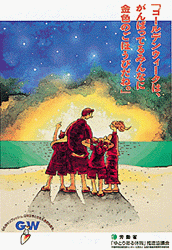|
Japan must successfully reduce working hours if it is to realize affluent and comfortable lives for its workers.
To address this issue, in the New Economic Plan "Social and Economic Plan for Structural Reforms" approved by cabinet decision in December 1995, a national goal of reaching and maintaining a level of 1,800 total annual working hours was set and a three-pronged policy for working hour reduction is being promoted which seeks proliferation of a five-day work week, encourages workers to take all the paid holidays they are allowed and reduces unscheduled overtime work.
In particular, the achievement of a labor system which operates on a five-day work week, or 40 working hours a week, has been a pre-eminent target for the last decade since the revision of the Labour Standards Law in 1987 in light of the international environment facing Japan.
As of April 1, 1997, the 40-hour work week has been fully implemented.
On the other hand, retail and service industry establishments which routinely have under 10 employees (the "exceptional" establishments specified), having introduced the 46-hour work week system as of April 1994, will have to introduce the 44-hour work week system on April 1, 2001. To this end, the following two subsidies were created to promote a reduction of working hours at those exceptional establishments specified.
| 1. |
The Subsidy for Employers of the Exceptional Establishments Specified for Reduced Working Hours
This program is for employers of exceptional establishments as specified, which will reduce their scheduled working hours to 44 hours per week or fewer (reduction of scheduled working hours by one or more hours per week is needed) while implementing at least one of the following measures -- investment in labor saving, new employment, and/or the use of a consultant -- by March 31, 2001.
The amount available:
Investment in labor saving (1.5 million yen or over) or new employment: 0.5 million yen
Use of a consultant: the actual cost, with an upper limit of 100,000 yen |
| 2. |
The Subsidy for Employer Organizations Which Contribute to a Reduction of Working Hours
This program is for employer organizations that provide consultation and guidance about the reduction of working hours for "exceptional" establishments.
The amount available is decided in consideration of the actual cost, with an upper limit of 5 million yen for municipal-level organizations and 10 million yen for prefectural-level organizations. The grant is available for one year. |
| A. |
Promoting measures to reduce working hours that match the realities of each industry and job type |
| 1. |
Guidance and assistance for intra-industry voluntary efforts to reduce woroking hours in industries where such efforts have been lagging. |
| 2. |
Promoting observance of Standards for Improvement of Working Hours for Vehicle Drivers. |
| B. |
Encouraging workers to take all paid holidays |
Based on the General Rules for Promotion of Meaningful Holidays, we have been implementing effective publicity campaigns, including the Meaningful Holiday Promotion Fair, focused on periods when public interest concerning holidays is high.
| C. |
Promotion of measures to reduce non-scheduled working hours |
Based on the revised Labour Standards Law which was passed in 1998, the Criteria of the Upper Limit of Overtime Work was established. Labor and management have to follow this criteria when they enter into an overtime work agreement. In addition, we are promoting the reduction of non-scheduled working hours based on the General Rules for Reduction of Non-scheduled Working Hours.
| D. |
Gaining national consensus on reduction of working hours |
Campaigns are conducted to form a national consensus, including the Golden Week Campaign (in May), the Hotto Week (Relieved Week) Campaign (in summer), and the One-Month Campaign to Promote a Comfortable Lifestyle (in November).
 |
 |
| Poster for Promoting Extended and Satisfying Holidays |
|

